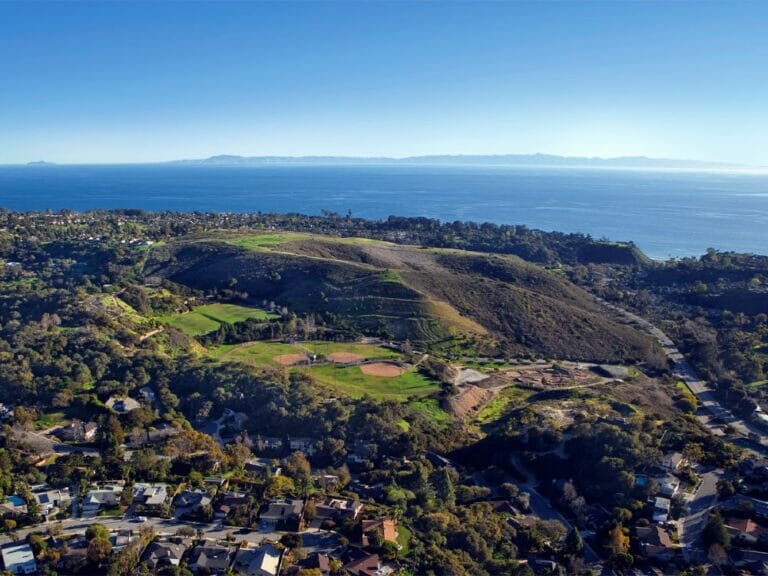The public is invited to take part in a series of eight free Nature Walks to explore the biodiversity of the 230-acre Elings Park as part of a new collaboration between the Park and Santa Barbara Botanic Garden. Each hike has a different natural history focus, such as plants, pollinators, or birds, and are led by Garden experts.
The first event, held Thursday, May 11 from 9 a.m. to 12 noon, is a “Bioblitz” of the Park led by Denise Knapp, Ph.D., the Garden’s director of conservation and research, and Annie Ayers, herbarium technician. After a brief tutorial, participants use the iNaturalist app on smartphones to record the pollinators, birds, bugs, plants, and more that they discover on the walk. No reservations are required. Meet at the parking lot adjacent to the park administration building. Participants should download and log in to iNaturalist (www.inaturalist.org) before the walk.
The data gathered on this walk will be used as part of a larger collaborative effort between the two partners and the public to transform a section of the Park from invasive to native plants and document the effects. Future walks are scheduled, once a month, through the end of 2023 (see below). For more information, visit www.SBBotanicGarden.org/calendar.
“We invite the public to join us in recovering this portion of Elings Park so they can see first-hand the power of California’s native plants,” says Dr. Knapp. “Ultimately, through this experience, we hope that our community will leave inspired and begin transformations in backyards and landscapes across Santa Barbara County and beyond.”
Elings Park opened in 1985 as the result of a community campaign to turn the former landfill into a public park. First encompassing 90 acres, the Park expanded to 230 acres in 1994 with the purchase of an adjacent property.
Approximately 75% of Elings Park is undeveloped. Nine miles of trails traverse shady oak groves and sunny, ocean-facing hillsides covered with chaparral. Nonnative plants, which have encroached on the natural landscapes, have been the target of the Park’s recent efforts at habitat restoration. Over the past two years, more than 250 California native oaks have been planted, plus hundreds of native grasses and shrubs. For the past three springs, a flock of sheep have been brought in for eco-friendly weed removal and fire prevention.
“While Elings Park is just steps away from thousands of residences, portions of it are still surprisingly wild,” says Dean Noble, Elings Park executive director. “Many people who enjoy our athletic facilities and cultural events have never visited our scenic South Bluffs. With the expertise of Santa Barbara Botanic Garden, we can transform that landscape and encourage the next generation of community scientists.”
FUTURE NATURE WALKS AT ELINGS PARK
Saturday, June 24, 9 to 10 a.m. – Elings Park and its Plants: Led by Denise Knapp, Ph.D., the Garden’s Director of Conservation and Research, and Annie Ayers, Herbarium Technician
Saturday, July 15, 9 to 10 a.m. – Pollinators: Led by Sarah Cusser, Ph.D., the Garden’s Terrestrial Invertebrate Conservation Ecologist, and Kylie Etter, Conservation Technician
Saturday, August 19, 9 to 10 a.m. – Invasive Plants: Led by Denise Knapp, Ph.D., the Garden’s Director of Conservation and Research, and Jorge Renteria Bustamante, Ph.D., Applied Ecologist
Saturday, September 16, 9 to 10 a.m. – Pollinators: Led by Sarah Cusser, Ph.D., the Garden’s Terrestrial Invertebrate Conservation Ecologist, and Kylie Etter, Conservation Technician.
Saturday, October 21, 9 a.m. to 10 a.m. – Birds: Led by Scot Pipkin, the Garden’s Director of Education, and Zach Philips, Ph.D., Terrestrial Invertebrate Conservation Ecologist
Saturday, November 18, 9 a.m. to 10 a.m. – Plants and Bugs: Led by Zach Philips, Ph.D., the Garden’s Terrestrial Invertebrate Conservation Ecologist, and José Flores, Conservation Technician
Saturday, December 16, 9 to 10 a.m. – Birds: Led by Scot Pipkin, the Garden’s Director of Education, and Zach Philips, Ph.D., Terrestrial Invertebrate Conservation Ecologist


Leave a Response